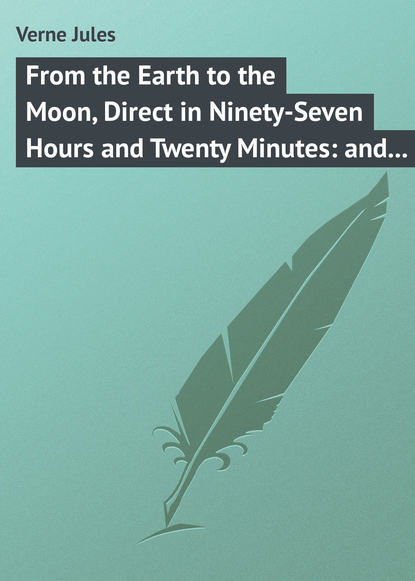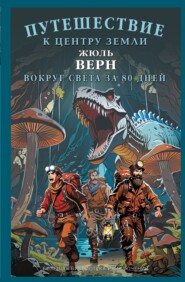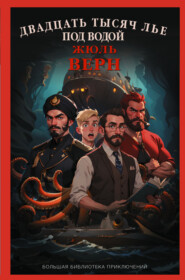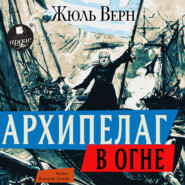По всем вопросам обращайтесь на: info@litportal.ru
(©) 2003-2024.
✖
From the Earth to the Moon, Direct in Ninety-Seven Hours and Twenty Minutes: and a Trip Round It
Настройки чтения
Размер шрифта
Высота строк
Поля
He turned. Michel Ardan was before him, repeating in a different tone, —
"And a kindhearted one!"
"Michel Ardan!" cried the captain. "Why are you here?"
"To press your hand, Nicholl, and to prevent you from either killing Barbicane or being killed by him."
"Barbicane!" returned the captain. "I have been looking for him for the last two hours in vain. Where is he hiding?"
"Nicholl!" said Michel Ardan, "this is not courteous! we ought always to treat an adversary with respect; rest assured if Barbicane is still alive we shall find him all the more easily; because if he has not, like you, been amusing himself with freeing oppressed birds, he must be looking for you. When we have found him, Michel Ardan tells you this, there will be no duel between you."
"Between President Barbicane and myself," gravely replied Nicholl, "there is a rivalry which the death of one of us – "
"Pooh, pooh!" said Ardan. "Brave fellows like you indeed! you shall not fight!"
"I will fight, sir!"
"No!"
"Captain," said J. T. Maston, with much feeling, "I am a friend of the president's, his alter ego, his second self; if you really must kill some one, shoot me! it will do just as well!"
"Sir," Nicholl replied, seizing his rifle convulsively, "these jokes – "
"Our friend Maston is not joking," replied Ardan. "I fully understand his idea of being killed himself in order to save his friend. But neither he nor Barbicane will fall before the balls of Captain Nicholl. Indeed I have so attractive a proposal to make to the two rivals, that both will be eager to accept it."
"What is it?" asked Nicholl with manifest incredulity.
"Patience!" exclaimed Ardan. "I can only reveal it in the presence of Barbicane."
"Let us go in search of him then!" cried the captain.
The three men started off at once; the captain having discharged his rifle threw it over his shoulder, and advanced in silence.
Another half-hour passed, and the pursuit was still fruitless. Maston was oppressed by sinister forebodings. He looked fiercely at Nicholl, asking himself whether the captain's vengeance had been already satisfied, and the unfortunate Barbicane, shot, was perhaps lying dead on some bloody track. The same thought seemed to occur to Ardan; and both were casting inquiring glances on Nicholl, when suddenly Maston paused.
The motionless figure of a man leaning against a gigantic catalpa twenty feet off appeared, half-veiled by the foliage. "It is he!" said Maston.
Barbicane never moved. Ardan looked at the captain, but he did not wince. Ardan went forward crying, —
"Barbicane, Barbicane!"
No answer! Ardan rushed towards his friend; but in the act of seizing his arms, he stopped short and uttered a cry of surprise.
Barbicane, pencil in hand, was tracing geometrical figures in a memorandum book, whilst his unloaded rifle lay beside him on the ground.
Absorbed in his studies, Barbicane, in his turn forgetful of the duel, had seen and heard nothing.
When Ardan took his hand, he looked up and stared at his visitor in astonishment.
"Ah, it is you!" he cried at last. "I have found it, my friend, I have found it!"
"What?"
"My plan!"
"What plan?"
"The plan for counteracting the effect of the shock at the departure of the projectile!"
"Indeed?" said Michel Ardan, looking at the captain out of the corner of his eye.
"Yes! water! simply water, which will act as a spring – ah! Maston," cried Barbicane, "you here also?"
"Himself," replied Ardan; "and permit me to introduce to you at the same time the worthy Captain Nicholl!"
"Nicholl!" cried Barbicane, who jumped up at once. "Pardon me, captain, I had quite forgotten – I am ready!"
Michel Ardan interfered, without giving the two enemies time to say anything more.
"Thank Heaven!" said he. "It is a happy thing that brave men like you two did not meet sooner! we should now have been mourning for one or other of you. But, thanks to Providence, which has interfered, there is now no further cause for alarm. When one forgets one's anger in mechanics or in cobwebs, it is a sign that the anger is not dangerous."
Michel Ardan then told the president how the captain had been found occupied.
"I put it to you now," said he in conclusion, "are two such good fellows as you are made on purpose to smash each other's skulls with shot?"
There was in "the situation" somewhat of the ridiculous, something quite unexpected; Michel Ardan saw this, and determined to effect a reconciliation.
"My good friends," said he, with his most bewitching smile, "this is nothing but a misunderstanding. Nothing more! well! to prove that it is all over between you, accept frankly the proposal I am going to make to you."
"Make it," said Nicholl.
"Our friend Barbicane believes that his projectile will go straight to the moon?"
"Yes, certainly," replied the president.
"And our friend Nicholl is persuaded it will fall back upon the earth?"
"I am certain of it," cried the captain.
"Good!" said Ardan. "I cannot pretend to make you agree; but I suggest this: – Go with me, and so see whether we are stopped on our journey."
"What?" exclaimed J. T. Maston, stupefied.
The two rivals, on this sudden proposal, looked steadily at each other. Barbicane waited for the captain's answer. Nicholl watched for the decision of the president.
"Well?" said Michel. "There is now no fear of the shock!"
"Done!" cried Barbicane.

















